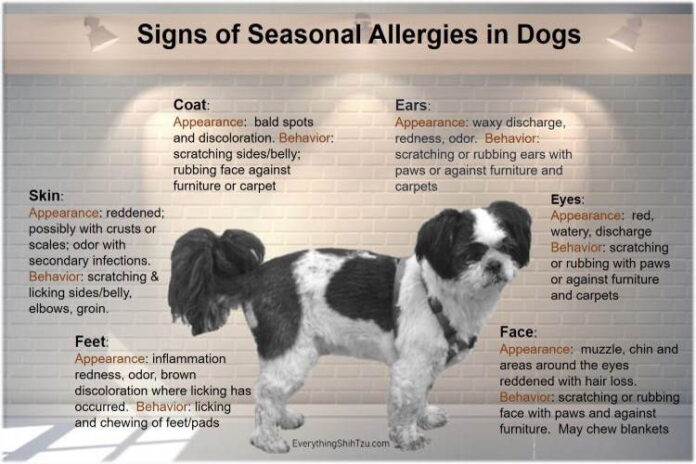Does your furry friend keep scratching and seem uncomfortable during certain times of the year? If you’re wondering what to give a dog for seasonal allergies, you’re in the right place This comprehensive guide will help you understand and manage your dog’s seasonal allergies effectively
Understanding Canine Seasonal Allergies
Just like humans, dogs can suffer from environmental allergies, which tend to flare up during specific seasons. These allergic reactions occur when their immune system overreacts to common environmental triggers like pollen, mold, or dust. For more detailed information about dog health and care, check out our dog care guide.
Natural Remedies for Dog Allergies
1. Apple Cider Vinegar Solution
- Mix equal parts water and apple cider vinegar
- Use as a topical spray for itchy spots
- Add small amounts to drinking water (1 teaspoon per large bowl)
2. Coconut Oil
- Apply directly to irritated skin
- Add to food (1 teaspoon per 10 pounds of body weight)
- Helps reduce inflammation and moisturize skin
3. Oatmeal Baths
- Use colloidal oatmeal
- Soak for 10-15 minutes
- Pat dry gently
Medical Treatments
1. Antihistamines
- Benadryl (diphenhydramine)
- Zyrtec (cetirizine)
- Claritin (loratadine)
Always consult your vet for proper dosing!
2. Prescription Medications
- Apoquel
- Cytopoint injections
- Steroids (for severe cases)
Preventive Measures
-
Regular Grooming
- Brush daily during allergy season
- Wipe paws after walks
- Use hypoallergenic wipes
-
Environmental Control
- HEPA air filters
- Regular vacuuming
- Wash bedding weekly
-
Diet Modifications
- Omega-3 supplements
- Probiotics
- Limited ingredient diets
When to See a Vet
Seek professional help if your dog shows:- Excessive scratching- Hair loss- Hot spots- Skin infections- Ear infections- Respiratory issues
Pet like boss offers comprehensive resources for pet parents dealing with various pet health issues, including seasonal allergies.
Tips for Managing Seasonal Allergies
-
Track Symptoms
- Keep a diary of flare-ups
- Note seasonal patterns
- Document effective treatments
-
Create a Safe Indoor Environment
- Use air purifiers
- Keep windows closed during peak pollen times
- Clean floors regularly
-
Strengthen Immune System
- Regular exercise
- Balanced diet
- Proper hydration
Common Seasonal Allergens
- Tree pollen (spring)
- Grass pollen (summer)
- Ragweed (fall)
- Mold spores (year-round)
- Dust mites
Year-Round Prevention Strategy
Spring
- Start antihistamines before symptoms appear
- Limit outdoor time during peak pollen hours
- Regular bathing
Summer
- Monitor grass exposure
- Early morning or late evening walks
- Frequent paw cleaning
Fall
- Watch for ragweed exposure
- Keep away from leaf piles
- Continue medication as needed
Winter
- Monitor indoor allergens
- Maintain humidity levels
- Regular cleaning routine
The Role of Diet in Allergy Management
Beneficial Foods
- Fresh vegetables
- Lean proteins
- Omega-rich foods
- Limited ingredient options
Foods to Avoid
- Common allergens
- Artificial preservatives
- Grain fillers
- Processed treats
Advanced Treatment Options
1. Immunotherapy
- Allergy shots
- Sublingual drops
- Custom formulated serums
2. Alternative Therapies
- Acupuncture
- Herbal remedies
- CBD products (where legal)
Final Thoughts
Managing seasonal allergies in dogs requires patience and a multi-faceted approach. Remember that what works for one dog might not work for another, so be prepared to try different combinations of treatments. Always consult with your veterinarian before starting any new treatment regimen.
Quick Action Steps
- Identify triggers
- Create an allergy management plan
- Stock up on necessary supplies
- Monitor symptoms
- Adjust treatments as needed
By following these guidelines and working closely with your vet, you can help your furry friend find relief from seasonal allergies. Remember to be patient, as finding the right combination of treatments may take time.
For more expert advice on pet care and health, visit Pet like boss, your trusted source for comprehensive pet information and guidance.
Disclaimer: This article is for informational purposes only and should not replace professional veterinary advice. Always consult your veterinarian before starting any new treatment regimen for your pet.












